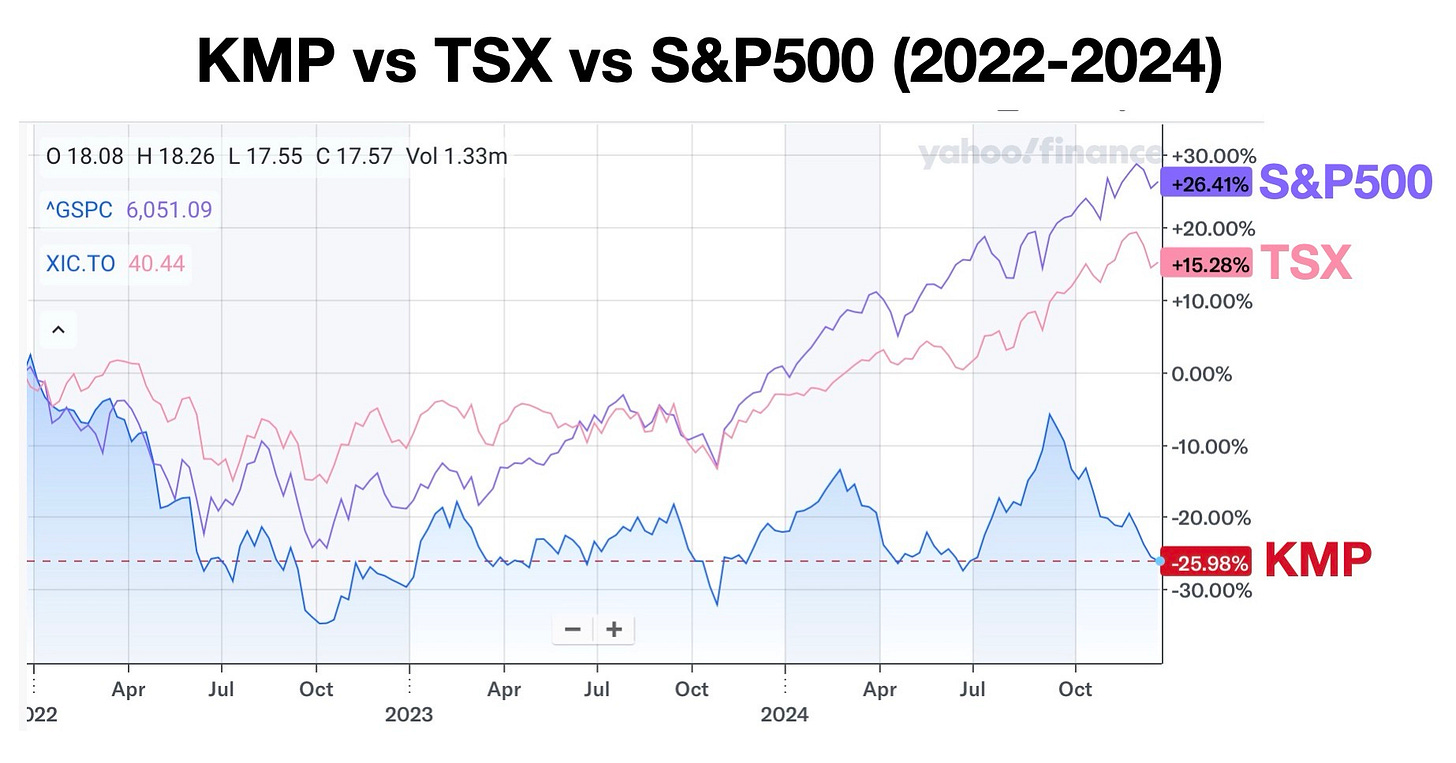Ditch the losers in your portfolio
Letting go to move forward in our investments and life
K M P
Those three letters make me wince every time I hear them.
KMP is the ticker for Killam Apartment Real Estate Investment Trust. It is a REIT (pronounced "reat") that trades on the Toronto Stock Exchange (TSX).
KMP is one of two individual stocks that I've held in my portfolio over the years. [The other is Alphabet/Google—a story for another time.] Everything else I own, as an ardent passive investor, is an index fund of some sort (e.g., VEQT, VUN, etc.).
I bought KMP in December 2021 on the advice of a trusted friend. I paid $22.50 per share—"a good price" I was told.
Fast forward three years, KMP is priced at $17.04 (as of December 23, 2024). My investment lost ~25% of its value, an annualized return of -9%.
It could be worse. KMP does pay out a decent dividend (4.19% yearly, paid monthly), so I've made a little cash along the way. And I guess I should be grateful that KMP hasn't gone bankrupt like some other REITs.
But still though. It's a dud.
Over the same time period, which admittedly has been a rollercoaster (2022 BAD, 2024 GOOD), the TSX is up over 15% and the S&P500 26%.
Loss aversion > our best intentions
I can't count the number of times I was tempted to sell my modest KMP holdings and then convinced myself out of it. This almost negligible part of my portfolio consumed more mental energy than the other 99%.
I struggle to recall why I even bought KMP in the first place. I think I wanted to add more income-generating holdings to my portfolio and maybe also increase my real estate allocation, which is only a modest 3% in most indices like the TSX and S&P500. [I've since changed my tune, realizing that far too much of my net worth is already tied up in real estate (my home)!]
That's the best I can figure for why I got into bed with KMP.
But these reasons have nothing to do with why I stayed in bed with KMP.
I’m guilty of straight-up loss aversion. I struggle to sell things at a loss.
Here's how the conversation plays out in my head:
Right brain: "Man, KMP is really stinking it up. I should ditch this loser."
Left brain: "But you'll be out 25% of your original investment. It might bounce back and then you'll be kicking yourself for selling. Just let it ride, brother."
Right brain: "Yeah, but I'm spending an inordinate amount of time and mental energy on this minuscule part of the portfolio. I could use the money from selling KMP to do so many other things."
At this point, I’d promise myself to sell KMP the next time I was on my brokerage account.
But, time after time, I never did.
Until the other day.
I got a notification that KMP was approaching its 52-week low.
And I decided that it was time to let go—of that perennial loser and all the cognitive load it brought with it.
Letting go to move forward
I was primed to make this decision after reading this Buddhist parable:
The Parable of the Raft
A traveling monk needs to get from one side of a river to the other. But there's no bridge or ferry and it's too far to swim. So he builds a raft out of logs and sails across. Once he reaches the other shore, he wonders what to do with the raft, which has proven so helpful to him. Should he bring it with him over land in case he encounters another river? Or leave it at the river's edge?
In my case, I left KMP at the river's edge. It might've been helpful to me at some point in the past (see above), but it had become a hindrance. I'd dragged it around for too long and it weighed me down.
There was a real opportunity cost to the time spent mulling over what to do with the KMP. That time could've been spent rebalancing my portfolio, playing guitar or spending time with my son.
We must let go in order to move forward.
That's the powerful message of the parable of the raft. It can be deployed in so many areas of our lives—dead-end relationships, beliefs, jobs, possesions, etc. There are so many things that we cling tightly to that no longer serve us or may actually cause us harm.
What's the KMP in your portfolio? What’s the KMP in the rest of your life? What is the opportunity cost to you of continuing to hold it? What would it be like to just let go and ditch the loser?
- The Buddh-i$h Investor
Take home points:
Loss aversion is a powerful deterrent from selling the losers in our portfolios.
Letting go of what hinders us, as taught by the Parable of the Raft, allows us to move forward.
If you’re looking for more:
Noah Rasheta (SecularBuddhism.com) on Letting Go: The Path to Freedom
Nobel Laureate Daniel Kahneman on loss aversion:



